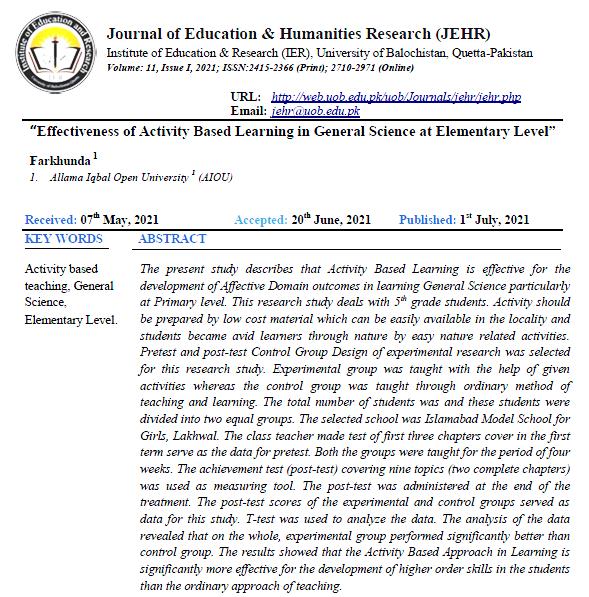Effectiveness of Activity Based Learning In General Science At Elementary Level
Keywords:
Activity based teaching, General Science, Elementary LevelAbstract
The present study describes that Activity Based Learning is effective for the development of Affective Domain outcomes in learning General Science particularly at Primary level. This research study deals with 5th grade students. Activity should be prepared by low cost material which can be easily available in the locality and students became avid learners through nature by easy nature related activities. Pretest and post-test Control Group Design of experimental research was selected for this research study. Experimental group was taught with the help of given activities whereas the control group was taught through ordinary method of teaching and learning. The total number of students was and these students were divided into two equal groups. The selected school was Islamabad Model School for Girls, Lakhwal. The class teacher made test of first three chapters cover in the first term serve as the data for pretest. Both the groups were taught for the period of four weeks. The achievement test (post-test) covering nine topics (two complete chapters) was used as measuring tool. The post-test was administered at the end of the treatment. The post-test scores of the experimental and control groups served as data for this study. T-test was used to analyze the data. The analysis of the data revealed that on the whole, experimental group performed significantly better than control group. The results showed that the Activity Based Approach in Learning is significantly more effective for the development of higher order skills in the students than the ordinary approach of teaching.
References
Akhtar, M., & Saeed, M. (2017). Applying Activity Based Learning (ABL) in Improving Quality of Teaching at Secondary School Level. Pakistan Journal of Educational , 02(02), 37-47. Retrieved from http://pu.edu.pk/images/journal/PJERE/PDF-FILES/3-V2_no2_17.pdf
Amuthavalli, & Sivakumar. (2014). Impact of Activity Based Learning on Learning Science at Primary Level. Shanlax International Journal of Education, 02(02), 60-69. Retrieved from http://www.shanlaxjournals.in/pdf/EDN/V2N2/EDN_V2_N2_009.pdf
Anwer, F. (2019). The effect of Activity-Based teaching techniques on student motivation and academic achievement. Journal of Education and Educational Developement, 06(01), 154-170.
Celik, H. C. (2018). The Effects of Activity Based Learning on Sixth Grade Students’ Achievement and Attitudes towards Mathematics Activities. EURASIA Journal of Mathematics, Science and Technology Education, 1963-1977. doi:https://doi.org/10.29333/ejmste/85807
Ergul, R., Simsekli, Y., Calis, S., Ozdilek, Z., Gocmencelebi, S., & Sanli, M. (2011). The effects of inquiry-based science teaching on elementary school students’ science process skills and science attitudes. Bulgaarian Journal of Science and Education Policy, 04, 48-68.
Hussain, S., Anwar, S., & Majoka, M. (2011). Effect of Peer Group Activity-Based Learning on Students‟ Academic Achievement in Physics at Secondary Level. International Journal of Academic Research, 03 (01), 940-944.
Kuyate, P. (2019). A Study of Effectiveness of Activity-Based Teaching Method in the English Subject of Standard IV. Educational Resurgence Journal , 01(01), 46-52. doi:https://dx.doi.org/10.2139/ssrn.3512758
Noreen, R., & Rana, A. M. (2019). Activity-Based Teaching versus Traditional Method of Teaching in Mathematics at Elementary Level. Bulletin of Education and Research, 41(02), 145-159. Retrieved from https://files.eric.ed.gov/fulltext/EJ1229426.pdf
Patil, U., Budihal, S. V., Siddamal, S. V., & Mudenagudi, U. K. (2016). Activity Based Teaching Learning: An Experience. Journal of Engineering Education Transformations(Special Issue). doi:10.16920/jeet/2016/v0i0/85433
Thayniath, S. (2015). Activity Based Language learning in the classroom-– An Effective Learning Method. International Journal of English Language, Literature and Humanities, 03(05), 33-40. Retrieved from http://ijellh.com/papers/2015/July/03-33-40-July-2015.pdf




